After a terrifying journey across the Mediterranean, thousands of migrants arrive in Sicily every week. These are their stories.
Emmanuel, 24, Ivory Coast
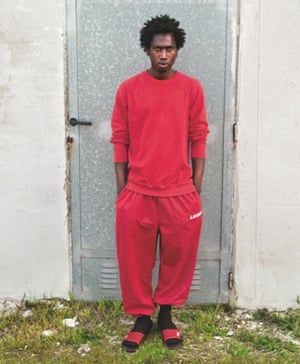 Emmanuel, 24, Ivory Coast: ‘There were more than 500 of us on that boat.’
Emmanuel, 24, Ivory Coast: ‘There were more than 500 of us on that boat.’
There was too much violence in Ivory Coast. You can’t live there. All my friends have left.
My parents divorced and didn’t look after me. I was nine when I had to drop out of school. I started working to look after myself and put some money aside, little by little. I went to Libya. I worked as an upholsterer so I could pay my rent and buy food. But at the end of the day, they would stop me in the street and take my money. I lived on eggs: they were cheap. But that wasn’t the problem. After almost two years, it became too violent and dangerous. Libyans don’t like anyone who is not Libyan. I was feeling bad; I had no choice but to leave again.
I looked for someone who could help me. I asked around, paid lots of money, and in three days I left. It was at night. There were more than 500 of us on that boat. Far too many. I didn’t see anything when I boarded, it was dark; but once I was inside, I immediately thought, I’m going to die. Two hours into the journey, the engine broke. I thought, it’s over now. The sea, you know, it’s not just a bit of water. I was ready for the end.
After two days, they rescued us. They gave us food – macaroni. I hadn’t eaten in two days, so it was good. You must go to a country where there is security and where human rights are respected, even if the risk is dying in the water.
Ibrahim, 29, and Sidibe, 10, Mali
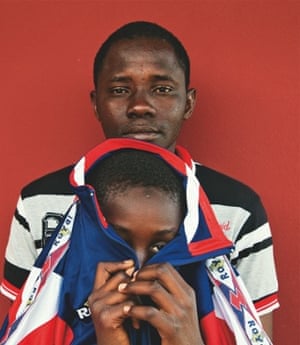 Ibrahim, 29, and Sidibe, 10, Mali: ‘On the night we departed, I saw lots of people dying around me.’
Ibrahim, 29, and Sidibe, 10, Mali: ‘On the night we departed, I saw lots of people dying around me.’
Ibrahim I was born in Congo-Brazzaville. My father died in the Congo war and I moved to Mali with my mother. My brother Sidibe was born to another dad.
One day, on television, I saw people who had made it to Italy. I was working in Congo-Brazzaville and decided to go there via Libya. I stopped in Mali, and during my stay my mother died. My brother was left alone, so I took him with me. But the journey was long and once we arrived in Libya, it was terrible.
Sidibe It was a very long journey. We travelled by bus from Algeria to Libya. The dust was so much – I really suffered. Then I had to walk for three hours across the border. I was tired. When we arrived in Ghadames, on the Libyan border, they gave me bread and cheese. That was so nice. Then they put us on a truck and I had to sit on sheep’s poo. I threw up. Later, we found a house. One night, at midnight, some policemen knocked at our door and took my brother away. I stayed alone at home for four days. I didn’t know what to do. I had only biscuits and water. I was frightened and thought I was not going to see Ibrahim again. I only have him.
Ibrahim I had done nothing, but they were armed and took me to prison. They said nothing, only asked for lots of money – 500,000 West African CFA francs (£555) – if I wanted to be freed. Once I was out, I started putting money aside for the journey by boat. On the night we departed, I saw lots of people dying around me. To get on board, you need to walk from the shore into the sea until the water reaches your shoulders. Then you are pushed on the dinghy. It’s there that people fall and die. The boat was crowded. I jumped on it and put Sidibe between my legs. We spent three days like this. The sea was going up and down, we were taking on water. When the rescue ship arrived, Sidibe was pulled to safety first. The Italians gave us food and water. They are good people. Now I want Sidibe to go to school.
Promise, 26, Nigeria
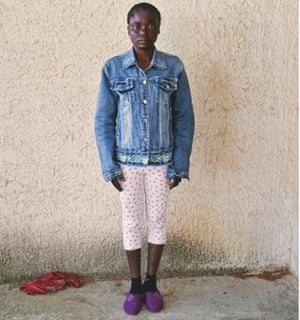 Promise, 26, Nigeria: ‘Libya is a Muslim country; they don’t like Christians like me.’
Promise, 26, Nigeria: ‘Libya is a Muslim country; they don’t like Christians like me.’
There was plenty of war in Nigeria. I lost my mother and father, my sisters and my brothers – we all ran away during the war, and I don’t know where they are now.
A man saved me from the war and took me to his house, but his wife thought I was sleeping with him. He gave me some money and told me to flee to Libya. But when I got there, I saw there was war, too. I found myself in Tripoli. There was fighting and killing all around us. Libya is a Muslim country; they don’t like Christians like me.
Somebody brought me to his house and told me to stay. They said they would help me go to Italy. But that house wasn’t a good one. It was very big and there were other people. I stayed for a long time, I can’t remember how long. Then somebody paid for me to get on a boat and come here. The journey was very long. I thought I was going to die. The sea was very big and dark. I was crying inside that boat: God help me, God save me. I prayed with another woman – we didn’t know each other. Finally we saw a ship coming. It was in the afternoon. We thought they were fishermen, but it was a rescue boat. We were waving, crying, shouting: help, help! And so [the Italians] came and rescued us. A man from the ship grabbed my hand – don’t rush, don’t rush, he said. I still remember him: he was slim and had a cap on his head. Thank God, I said. I’m happy now, but I feel very alone.
Maryan, 20, Somalia
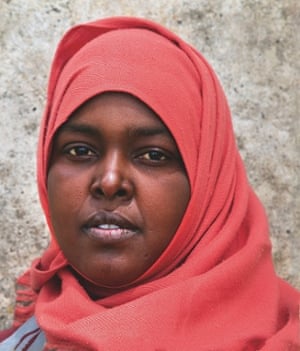 Maryan, 20, Somalia: ‘I have a husband back home and two children.’
Maryan, 20, Somalia: ‘I have a husband back home and two children.’
My dad went to Canada when I was born. A year later, I moved with my mum to Kenya; there was fighting in Somalia. I have a sister and four brothers. We stayed in a UNHCR refugee camp. That’s where I learned English; I studied there. We wanted to get visas for America, but we are Africans, you know? They sent us back to Somalia instead.
One day, a few years ago, al-Shabaab brought our house down. There was an explosion. My mother died; I still miss her. I have a husband back home and two children. They live in a town between Somalia and Ethiopia.
I didn’t tell anyone that I wanted to leave, initially – only a friend. She helped me organise my travel to Libya, then to Italy, to go to America. I want to give my family a good life. While moving countries and phone numbers, we lost contact with my dad. But I want to find him now. I have an aunt, his sister, in the US. That’s where I want to go.
Faith, 25, Nigeria
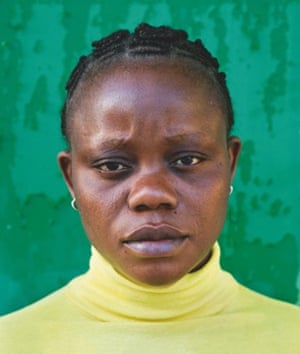 Faith, 25, Nigeria: ‘When we reached Sabha, I was kidnapped together with another woman.’
Faith, 25, Nigeria: ‘When we reached Sabha, I was kidnapped together with another woman.’
My mother died when she gave birth to me. I was four when I also lost my dad. I was staying with my grandma – no school, nothing – but six years ago, she died as well. I went to stay with one of my aunties in Kano, northern Nigeria, but there was fighting all over. Boko Haram was there, so I came back home.
One of my friends said she was going to Libya, so I followed her in December last year. When we reached Sabha [a hub of the trafficking trade in the south-west], I was kidnapped together with another woman. They kept us in a room with five more women. No food to eat, nothing for four days. Until, one night, a man we didn’t know helped us escape. He told us to run, that the place was not safe for us.
It was night-time. We ended up by the sea. The man said we should get on a boat – there were lots of people. The next day, around two in the afternoon, they came to rescue us. I’m OK now, but every time I think of my past, I stop eating. People call their mum and dad. I didn’t know my mum. I have no one to call.
Omar, 30, the Gambia
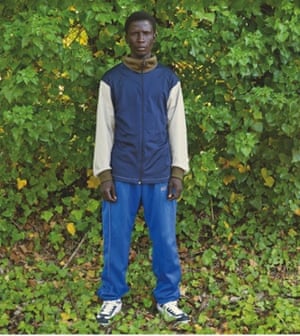 Omar, 30, the Gambia: ‘It would have been better to die in the water on the way to Italy than to stay in Libya.’
Omar, 30, the Gambia: ‘It would have been better to die in the water on the way to Italy than to stay in Libya.’
I came to find a better future in Europe. Because of the bad governance, corruption and poverty in our country – in all African countries. This makes people run away.
I come from a very extended family. My father is not alive, there are 17 of us, and they all rely on me. I’m a mobile technician – I repair phones. Out of the little money I was earning, three-quarters went to the family. It was not enough to satisfy me, let alone them. I heard you could make a lot of money in Libya. All my friends in the Gambia left to go there.
They told me that the province was safe, that you can work and earn money. I stayed almost three years, but then the problems spread across the country. They kidnapped blacks everywhere, demanding £1,200-£2,000 as a ransom. After a year, my brother joined me in Libya, but he was injured at work and died. There was no hospital to take him to. It was too dangerous. They kidnap you in the street, but it’s better to be taken by the bandits than the police; at least the kidnappers want to keep you alive to get the money from your family.
I was put in prison, and given very little food. My family didn’t have any money to pay. Once I was out, I started working, but didn’t get paid. Then I was offered a chance to come to Italy. The people who do this don’t hide; they approach you in the street. Even the police approach people. My boat was a dinghy. We were more than 100 people, and my family knew nothing about it. Nobody on the boat expected such a bad journey, but it would have been better to die in the water on the way to Italy than to stay in Libya. One day, I will go back home.
Kwame, 25, Ghana
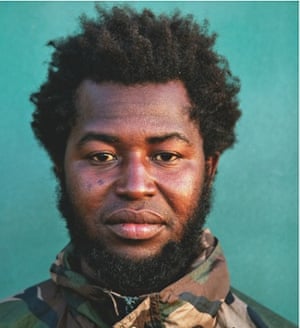 Kwane, 25, Ghana: ‘From Libya you can’t get a car or jump on a plane. If you try to cross the border, you will be shot.’
Kwane, 25, Ghana: ‘From Libya you can’t get a car or jump on a plane. If you try to cross the border, you will be shot.’
I didn’t want to come to Europe. I wanted to work in Libya. I stayed there for two years. But then I thought I was going to die, so I decided to leave. But from Libya you can’t get a car or jump on a plane. If you try to cross the border, you will be shot.
I took a boat to Italy because it’s near. If I knew more about the journey, I would never have come. They pushed us on the boat; there were 93 of us, fighting for our lives in that tiny boat. We didn’t know if the captain was qualified. I cried. The boat began to sink and the captain called the rescue ship. It was eight o’clock when it arrived.
They took me to a reception centre. There were 400 of us at the beginning. Now they have moved 300 people, taking them to Rome and Milan. I don’t have anything with me here. I don’t have my family’s phone numbers. All I had was a memory card that they stole from me before I jumped on the boat. We’ve been sitting here for two weeks now. We spend the day walking up and down. You don’t know what is going on. I want to work. My family in Ghana has nothing. I am hopeful that something will change.
Valerie, 27, Ivory Coast
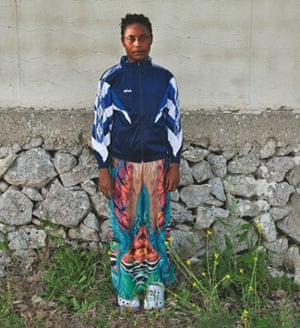 Valerie, 27, Ivory Coast: ‘I left Ivory Coast because my parents were planning a forced marriage. I’m a Muslim, and I refused.’
Valerie, 27, Ivory Coast: ‘I left Ivory Coast because my parents were planning a forced marriage. I’m a Muslim, and I refused.’
This dress is the only thing I have with me. It’s old, but it’s my favourite and reminds me of my three girlfriends back home. I bought it for New Year’s Eve. We had fun that night, watching the fireworks. I washed it after the journey by boat. It was soaked.
I left Ivory Coast because my parents were planning a forced marriage. I’m a Muslim, and I refused. My father kicked me out. I decided to join my brother in Tripoli. I travelled across Burkina Faso and via Agadez in Niger [part of a well-known traffickers’ route], then through Libya.
Every time you come into contact with the “police”, you have to pay. I spent a week in Sabha, where we paid people to take us to Tripoli. There, we were sold again to different people, who then sold us on.
When they take you, they make you work. In Libya I was kidnapped and put in prison for a month. I was raped many times. There were lots of women like me. I was sharing a cell with a girl from Mali and one from Nigeria. We communicated with our hands, and the Nigerian girl became a friend.
Our dream was to come to Europe. My brother paid £218 to help me – his friends had raised some money to free me. But then I became ill – I couldn’t eat, I couldn’t sleep. I was worried the people from the prison would come again. So he organised my travel to Europe. I’ve been here two weeks. I just want to work.
Joy, 20, Nigeria
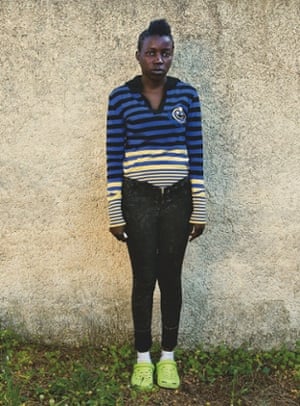 Joy, 20, Nigeria: ‘I left Nigeria because of Boko Haram. We need your help.’
Joy, 20, Nigeria: ‘I left Nigeria because of Boko Haram. We need your help.’
I left Nigeria because of Boko Haram. We need your help: they killed my parents, my sisters, my brothers. My friend and I didn’t know where to go, we wanted to save our lives. A man took us to Libya, but he put us into prostitution. I had no food, and if I refused to do what he wanted, he would beat me and threaten me with a gun.
I was forced to work as a prostitute for a year. We managed to run away and met a man who paid for us to get on a boat. I was praying to my God. Now I’m here with my best friend. But I’m sad when I think about my family. I want to become a journalist, a newscaster. I will try my best.
Karim, 30, Mali
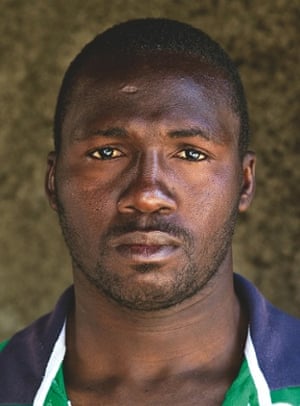 Karim, 30, Mali: ‘I am here because of the war. One day I came home after work and found that my mother had been killed. My little sister had been killed. They were dead on the floor.’
Karim, 30, Mali: ‘I am here because of the war. One day I came home after work and found that my mother had been killed. My little sister had been killed. They were dead on the floor.’
I’m here because of the war. In Mali, I was repairing motorbikes. One day I came home after work and found that my mother had been killed. My little sister had been killed. They were dead on the floor. I asked myself, why wasn’t I there?
Then I thought, if I had been there, they would have killed me, too. I ran out and flew to Algeria. But once I arrived, I discovered that it was difficult to find a job and make a living. There are no motorbikes there, only cars. I became worried. I moved to Tripoli to be able to eat. There’s more work, but it’s also more dangerous.
In the street, if they see you’re a foreigner, they will shout, “Come here!” If you don’t run, they’ll beat you. They hit me many times, once with the back of a gun. I found a job cleaning the houses of wealthy people. But on the way back from work, they would strip me of my clothing and take the money I had earned. Once, I went three days without eating. I had to look for food in the rubbish.
One day, a man offered to pay for me to go to Italy. There was war in Libya. Even that night – boom boom – you could hear it. I thought, I’ll leave. That’s why I’m here. But I still have so much sorrow. My life is finished without my mother and sister. There was a time when I wanted to get married and have a family, but now I don’t. My children would ask me, “Where is grandma?” I loved my mother. I don’t care about finding a woman.
Rose, 21, Nigeria
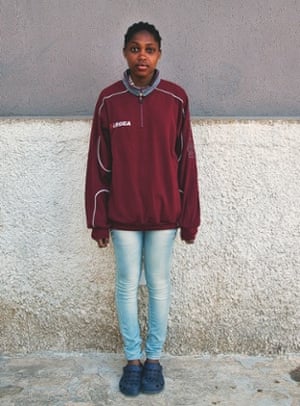 Rose, 21, Nigeria: ‘Now I want the UN to help me. I don’t want to sell myself for money.’
Rose, 21, Nigeria: ‘Now I want the UN to help me. I don’t want to sell myself for money.’
I wanted to become a nurse in Nigeria, but when my family was murdered right in front of me, I decided to escape. I met a man and told him I needed help, since I was an orphan – no one to talk to, just me. He said he was going to take me to Libya to work in a restaurant with him. I went, not knowing that he was bringing me there to work as a prostitute and make money for him. He told me that when we arrived in Libya.
I said to him, “I can’t do it.” He locked me up for some months and beat me every night and day. There was nowhere to escape. There were lots of people like me in the same room. No one could hear us. Sometimes, they didn’t even give us food.
One day, a man came to the house. I told him, “I can’t continue staying in this place. Please help me.” He said OK, on the condition that I follow him to his house. I went, not knowing he was taking me to the seaside. So, all of a sudden, I found myself on the Mediterranean sea.
We were many; I was really scared. The water has no end and no beginning. A lot of people were fighting with sharp objects. There were Muslims and Christians. They said they didn’t want Christians on the boat. I was one of them. Then the heat burned one of the girls. I cried. God, did this man bring me out of that place to kill me in the water? I can’t even explain it. A lot of things happened before we saw the rescue ship. I was very happy then. Now I want the UN to help me. I don’t want to sell myself for money.
Names have been changed
Gideon Mendel’s audio slideshow